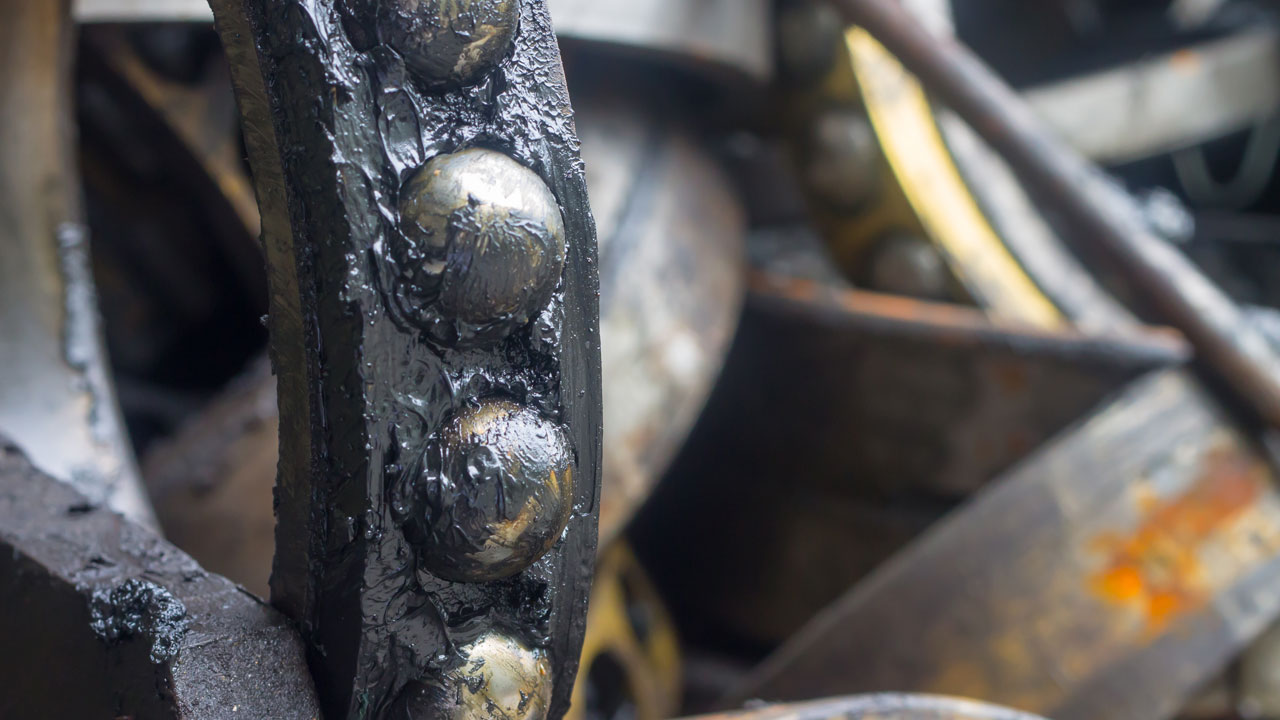
Why do bearings fail?
Unfortunately, there isn’t a one-size fits all answer. When we evaluate bearing materials and performance for any application, we also examine why previous materials have failed. We analyze operating conditions, running temperatures, lubrication issues, fatigue factors, and environmental exposure to determine the root cause of bearing wear.
It is often the culmination of all these factors rather than a single issue that determines bearing service life. Below is a detailed overview of the most common causes of bearing failure and how to avoid them in your next design.
Major Causes of Bearing Failure
1. Bearing Lubrication Failures
Without the right lubrication, bearings can overheat and wear prematurely, leading to costly maintenance and downtime.
Lubrication-related failures can result from:
- Insufficient lubrication or starvation
- Using the wrong lubricant for the environment
- Total breakdown of lubrication under load or temperature
- Excess grease attracting dust and contaminants
Self-lubricating plastic bearings eliminate all these concerns because they run “dry” and maintenance-free, without the need for external oil or grease. This design prevents lubricant migration, contamination buildup, and thermal degradation.
Examples of self-lubricating solutions:
- Rulon®: PTFE-based polymer bearings that resist chemical attack and wear.
- CJ® and Ultracomp® composites: Perfect for dirty, abrasive, or high-load environments.
- TriSteel® metal-backed bushings: Combine structural strength with self-lubricating polymer liners for automotive and heavy-duty applications.
Expert Note from Tristar: Traditional greased bronze or metal bearings rely on consistent lubrication, which is often disrupted by contamination, evaporation, or over-greasing. Tristar’s self-lubricating bearings integrate solid lubricants within the material, providing a clean, consistent lubrication film that never requires maintenance. This design eliminates one of the most frequent causes of bearing failure: human error in lubrication management.
2. Working Conditions and Environmental Factors
What are the everyday conditions your bearings face? Exposure to cleaning chemicals, saltwater, construction dust, abrasive grit, or heavy vibration can accelerate bearing wear.
It’s critical to match bearing materials to the right environment:
- Rulon® J delivers excellent wear, friction, and temperature stability across diverse conditions but is not ideal for continuously wet environments.
- Ultracomp® composites perform exceptionally in dirty or wet outdoor settings such as marine, construction, and oilfield applications.
- Meldin® high-performance polymers withstand aggressive chemicals and high heat where other plastics soften or degrade.
Expert Note from Tristar: Each environment presents unique challenges. Our engineers evaluate your duty cycle, temperature range, and exposure profile before recommending a material. Matching chemistry and composition to your operating conditions is key to ensuring long bearing life and consistent performance.
3. Shifting and Misalignment
After hundreds of hours of operation, frequent start/stop cycles, and exposure to vibration, bearings can shift out of alignment. This misalignment leads to uneven wear, edge loading, and early failure; especially in metal bearings that lack flexibility.
Self-lubricating composite bearings, such as Ultracomp®, are engineered to absorb misalignment and vibration while maintaining low friction and long-term stability. These materials thrive in demanding sectors like construction, rail, and oil & gas, where constant load fluctuations are common.
Expert Note from Tristar: Alignment errors are one of the top hidden causes of bearing wear. Composite and polymer bushings provide superior misalignment tolerance compared to metal alternatives, reducing stress concentrations and prolonging both bearing and shaft life.
4. Temperature Mismanagement
Many designers assume that a thicker bearing wall resists higher temperatures, but the opposite is true. Thicker walls often trap heat, causing expansion and accelerated wear.
Plastic and composite bearings offer superior heat dissipation, lower friction, and higher PV (pressure × velocity) ratings compared to greased bronze bushings. Advanced materials like PEEK, Meldin®, and Rulon® can withstand temperatures up to 500°F (260°C) while maintaining dimensional stability and low friction.
Expert Note from Tristar: Temperature is a silent bearing killer. Our application engineers evaluate your full thermal profile: ambient heat, frictional buildup, and exposure to chemicals or steam; to ensure the chosen bearing material performs reliably without distortion or seizure.
How to Prevent Bearing Failure
- Use self-lubricating materials to eliminate grease dependency and contamination.
- Match material properties to the environment (chemical exposure, load, and motion).
- Design for proper alignment and shaft fit to reduce uneven wear.
- Account for thermal expansion in polymers and composite bushings.
- Partner with an experienced bearing manufacturer for application review and testing.
Next Steps
Have you experienced a recent bearing failure? Share your experience with our team, and we’ll help you explore self-lubricating alternatives to traditional metal bearings.
- Submit an Engineering Worksheet for personalized material selection.
- Review our Case Studies for insights on how other companies improved reliability.
- Explore our Bearings 101 Guide for best practices in design and maintenance.









